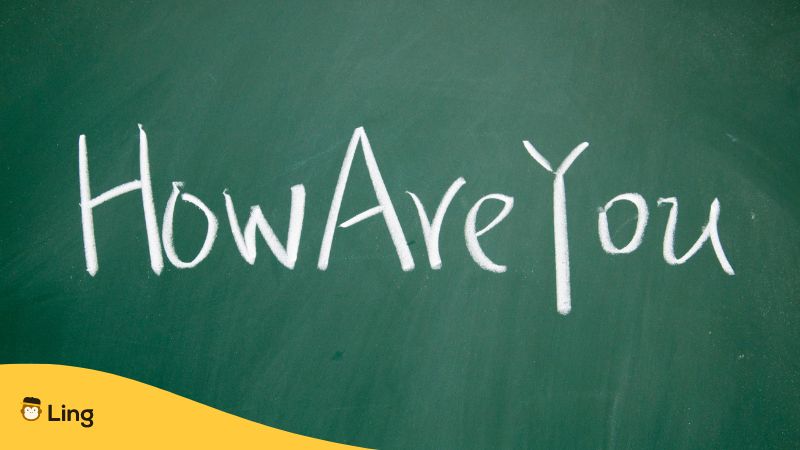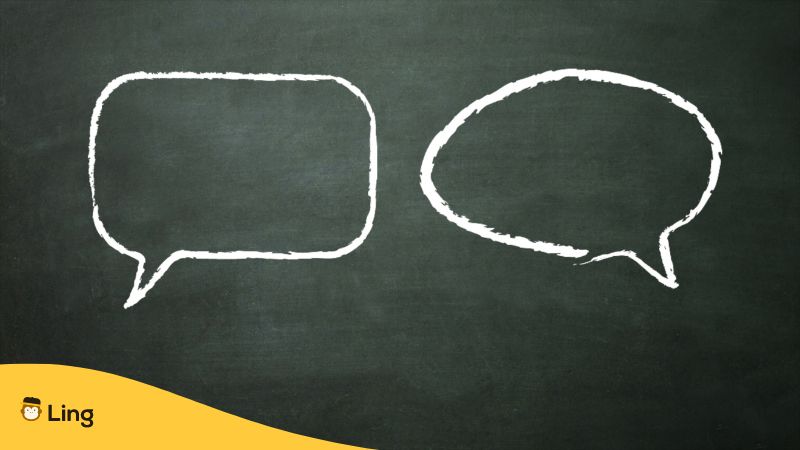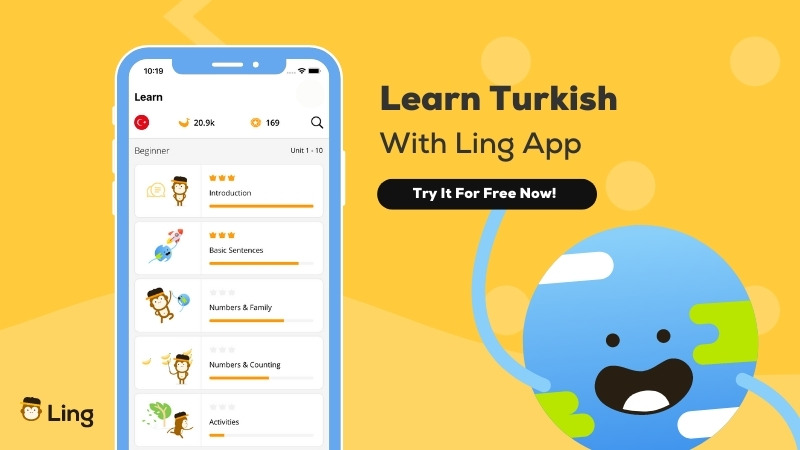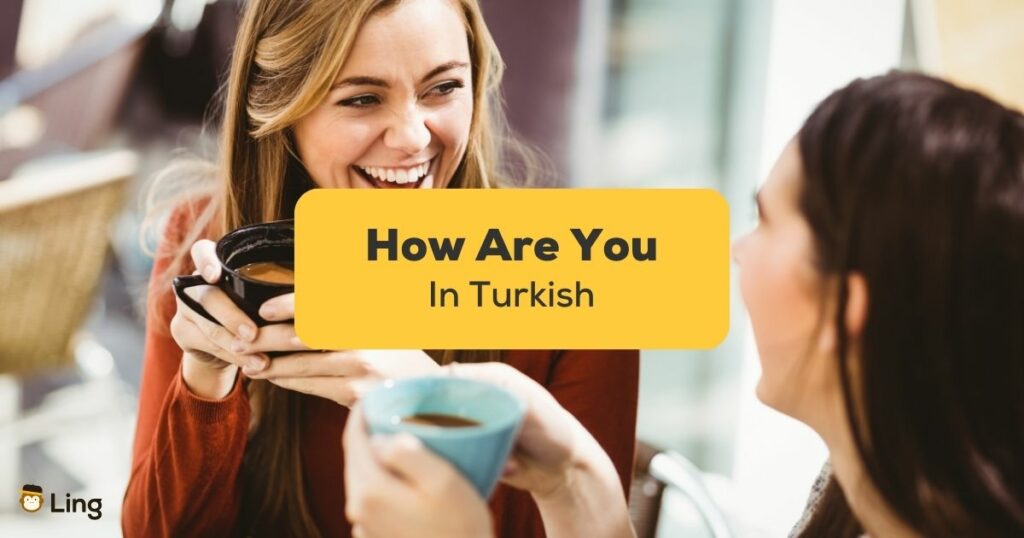Small talks are important in daily conversation. Whether you’re studying the Turkish language or visiting Turkey as a traveler, you should be able to greet people and have small talk with them in Turkish.
So, the first thing you should say – after merhaba – to start a small talk is how are you in Turkish? Native Turkish speakers use more than one phrase to ask about someone, and in this blog post, you’ll learn six different phrases for it. But that’s not all, you’ll also learn how to respond to it in Turkish.
Page Contents:
- How To Ask How Are You In Turkish?
- How To Reply To “Nasılsın” In Turkish?
- Example Dialogues In Turkish
- Start Learning Turkish With Ling!

How To Ask How Are You In Turkish?
Here are the common Turkish phrases that every native speaker uses daily. You can also see their English translations right below and listen to their pronunciation.
1. Nasılsın?
Meaning: How are you?
“Nasıl” literally means how which is the most commonly used word for asking about someone. It’s a neutral phrase, but if you want to sound formal and polite, you can say “nasılsınız?” by changing it to second person plural.
2. Naber?
Meaning: What’s up?
This phrase means “what’s up” and similarly, it’s an informal and casual phrase that you should only say to your friends. This Turkish phrase is actually transformed to “naber” from “ne haber” which literally means what news by the time.
3. Ne yapıyorsun?
Meaning: What are you doing?
Well, this phrase is not really asking how someone is; it actually asks what someone is doing, like physically “what are you up to?” However, we sometimes use it interchangeably with “nasılsın” in Turkey.
I know it’s weird but many Turks do this, including me. So it’s very likely to witness a conversation between two Turks:
A: Selam, ne yapıyorsun? (Hey, what are you doing?)
B: İyiyim, sen ne yapıyorsun? (I’m fine, what about you?)
A: Nasılsın demedim. Ne yapıyorsun dedim. (I didn’t say how are you. I’ve said what are you doing.)
My sister and I have this conversation almost every day, and she is the one saying “I didn’t say how are you.” 😂
4. Nasıl gidiyor?
Meaning: How is it going?
This is another casual phrase to use instead of nasılsın. It has a meaning like how is life going or how have you been lately.
5. Ne var ne yok?
Meaning: How do you do? / How are things?
People usually ask this to catch up with the latest news in someone’s life if they haven’t seen each other in a long time. This is another informal phrase so use it when you’re talking to friends.
6. Neyin var?
Meaning: What’s wrong?
If someone looks unwell as if they’re suffering from something, you can ask “neyin var?” to check on them and find out what’s bothering them.

How To Reply To “Nasılsın” In Turkish?
Only asking is not enough, you should also know how to respond to how are you in Turkish. Here are some useful and simple phrases for you.
1. İyiyim
Meaning: I’m fine.
The standard answer to “nasılsın” is “iyiyim” but some people say so even though they don’t feel good. Because they don’t want to bother explaining why they’re not good. Say it like you mean it!
2. Kötüyüm
Meaning: I’m bad.
If you are not feeling good be honest and say “kötüyüm” or “iyi değilim (I’m not good).” But be prepared to answer a volley of questions. They probably won’t let it go until they make you smile.
3. Aynı
Meaning: Same.
Well, maybe there is nothing much to talk about, and nothing has changed since you last talked to each other. In this case, you can say “aynı,” same, nothing new.
4. Hastayım
Meaning: I’m sick.
Maybe you caught a chill last night and feel weak and sick; then you can say “hastayım” to let the other person know why you don’t look good.
5. Uykuluyum
Meaning: I’m sleepy.
Have you been pulling a face all day because you were up with the lark? (well, that sounds like me). When someone asks you what’s wrong, “neyin var?” you can answer it by saying “uykuluyum” or “uykum var” both mean I’m sleepy.
6. Ya sen?
Meaning: And you? / What about you?
After replying to someone’s question, it’s polite to ask about them so you can say “ya sen” in an informal situation or “ya siz” in a formal situation. This way, you can ask how they are in a quick and natural way.
7. Sorduğunuz için teşekkürler
Meaning: Thanks for asking.
If you want to be extra polite, you can say “sorduğunuz için teşekkürler” which has a meaning thanks for asking about me. You should say this phrase only in formal situations.

Example Dialogues In Turkish
Here are some real-life Turkish dialogues to see the words in context and learn better.
A: Merhaba, nasılsınız? (Hi, how are you?)
B: Merhaba, iyiyim teşekkür ederim. Ya siz? (Hello, I’m fine thank you. What about you?)
A: Çok iyiyim. (I’m very good.)
A: Selam kanka, naber? (Hey buddy, what’s up?)
B: Aynı, senden naber? (Same, what about you?)
A: Ben hastayım biraz. (I’m a little bit sick.)
A: Kötü görünüyorsun neyin var? (What’s wrong? You look bad.)
B: Uykum var sadece. (I’m just sleepy.)
This blog post ends here but learning Turkish doesn’t! Download Ling now and learn something new in Turkish every single day.
Start Learning Turkish With Ling!
If you want to learn the Turkish language or other foreign languages, waste no more time and check out Ling to start learning something new today!

Ling is a language learning app designed to help all language learners passionate about learning a new language. Ling consists of various interactive exercises, such as writing and listening exercises, mini quizzes, and an AI chatbot to practice your speaking skills. Ling offers you everything to enhance the four primary language skills.
Also, remember to go to Ling’s Turkish blog for new weekly articles about learning Turkish and its culture!
So, what are you waiting for? Try Ling for FREE by downloading it from the App Store or Play Store!
Until next time! Görüşürüz!



































































